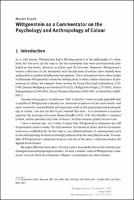Chapter Wittgenstein as a Commentator on the Psychology and Anthropology of Colour
Author(s)
Kusch, Martin
Contributor(s)
Gierlinger, Frederik A. (editor)
Riegelnik, Štefan (editor)
Collection
European Research Council (ERC); EU collectionLanguage
EnglishAbstract
As is well known, Wittgenstein had a life-long interest in the philosophy of colour, from the Tractatus all the way to the last notebooks that were posthumously published as two books, Remarks on Colour and On Certainty. Moreover, Wittgenstein’s various reflections of the perception and classification of colours have already been analyzed by a number of influential interpreters. These interpreters have often sought to illuminate Wittgenstein’s views by relating them to other, earlier treatments of phenomena of colour, for example those written by Georg Christoph Lichtenberg (1742-1799), Johann Wolfgang von Goethe (1749-1832), Philipp Otto Runge (1777-1810), Arthur Schopenhauer (1788-1860), Franz Clemens Brentano (1838-1917), or David Katz (1884-1953).¹One aim of my paper is to add a new “foil” to this list: I want to make plausible that a number of Wittgenstein’s remarks on colour are responses to late-nineteenth- and early-twentieth-century British and American work on the psychology and anthropology of colour. I am not the first to put forward this idea – it is mentioned in a recent paper by the historian of science Simon Schaffer (2010: 279). But Schaffer’s comment is brief, and he provides only little evidence. So there remains plenty for me to do. I have a second aim, too. I want to argue that Wittgenstein’s comments are still of systematic interest today. The link between the historical thesis and the systematic concern is established by the fact that a very influential body of contemporary work in the anthropology of colour is strongly influenced by the early British work. Presumably, if Wittgenstein’s comments work as criticism of the latter, it will also weaken the appeal of the former. My paper falls into three parts. Section 2 gives an introduction to the relevant psychological and anthropological studies. Section 3 situates some of Wittgenstein’s comments vis-à-vis these investigations. Chapter 4 summarises my observations.
Keywords
20th-Century Philosophy; Aesthetics; Studies on ColourDOI
10.1515/9783110351101.93ISBN
9783110554809; 9783110383355OCN
1135844990Publisher
De GruyterPublisher website
https://www.degruyter.com/Publication date and place
Berlin/Boston, 2014Grantor
Classification
Western philosophy from c 1800
Philosophy: aesthetics


 Download
Download